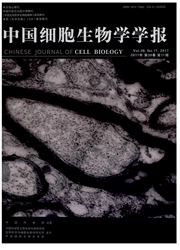

 中文摘要:
中文摘要:
人LKB1(Liver Kinase B1,或Serine-Threonine Kinase11,STKII)基因的胚系失活突变可导致癌症易感病皮杰氏综合征(Peutz-Jeghers syndrome,PJS),该病患者多发错构瘤息肉且患癌症风险增加。LKB1基因的体细胞突变还广泛地存在于众多类型的恶性肿瘤中,如肺癌、结肠癌和乳腺癌等,因此,LKB1被普遍认为是抑癌基因。LKB1基因的编码产物LKB1是一种丝氨酸/苏氨酸激酶,调节多种细胞生理病理过程。虽然LKB1的抑癌机制尚不完全清楚,但现有的研究表明,对细胞生长增殖、能量代谢和细胞极性等的调控是其抑制肿瘤发生和发展的重要方面。本文就目前已知的LKB1的抑癌机制作一综述。
 英文摘要:
英文摘要:
Inactivating germline mutations in the human LKB1 gene underlie the cancer disorder Peutz- Jeghers syndrome (PJS) featured by hamartomatous polyps and elevated risks for cancers. Somatic mutations of LKB1 are also frequently found in many malignancies such as lung, colon and breast cancers, so LKB1 is commonly accepted as a tumor suppressor gene. The product of LKB1 gene, LKB 1, is a serine-threonine protein kinase that is involved in multiple physiological and pathological processes. Although the exact anti-tumor mechanisms of LKB 1 remain to be further elucidated, current evidences indicate that regulating cell growth and proliferation, orchestrat- ing energy metabolism and maintaining cell polarity by LKB 1 contribute to its tumor suppressor role. We summarize the progress of researches as to how LKB 1 inhibits tumorigenesis.
 同期刊论文项目
同期刊论文项目
 同项目期刊论文
同项目期刊论文
 Inhibition of STAT1 methylation is involved in the resistance of hepatitis B virus to Interferon alp
Inhibition of STAT1 methylation is involved in the resistance of hepatitis B virus to Interferon alp Engineering a pharmacologically superior form of granulocyte-colony-stimulating factor by fusion wit
Engineering a pharmacologically superior form of granulocyte-colony-stimulating factor by fusion wit Genes related to the very early stage of ConA-induced fulminant hepatitis: a gene-chip-based study i
Genes related to the very early stage of ConA-induced fulminant hepatitis: a gene-chip-based study i The Open Reading Frame 3a Protein of Severe Acute Respiratory Syndrome-Associated Coronavirus Promot
The Open Reading Frame 3a Protein of Severe Acute Respiratory Syndrome-Associated Coronavirus Promot 期刊信息
期刊信息
